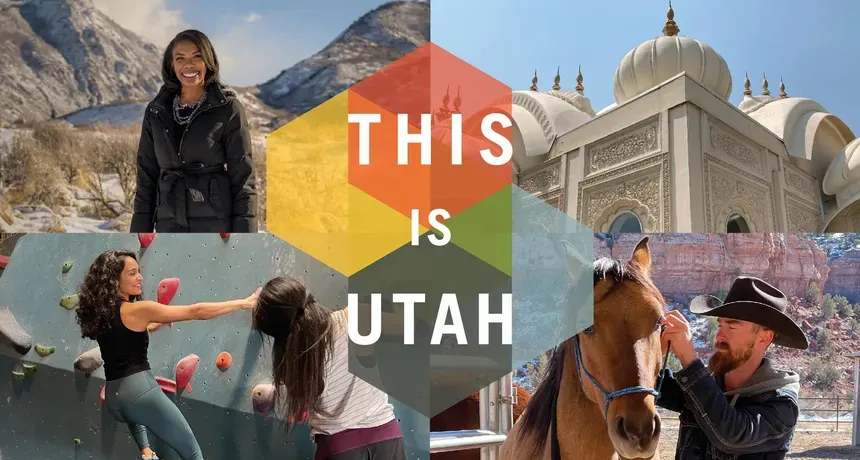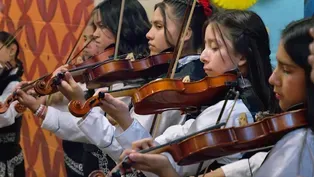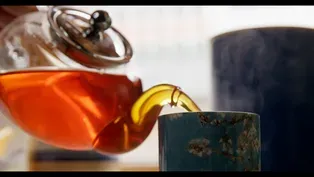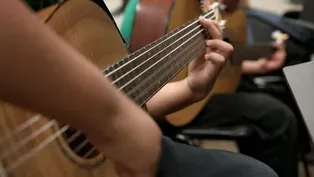
Culture Craft
Season 4 Episode 2 | 26m 46sVideo has Closed Captions
The power of cultural traditions can unite people and spark transformative change.
The power of cultural traditions is unparalleled in its ability to unite people. Meet Allan Moreno, a musician who established Academia Mis Raíces (My Roots Academy), which teaches students the significance of mariachi music. Taiwanese American baker, Mika Lee, invites you to indulge in the art of afternoon tea from Honey Teahive. And witness stunning Polynesian fashion by designer Denise Koli.
Problems with Closed Captions? Closed Captioning Feedback
Problems with Closed Captions? Closed Captioning Feedback
This Is Utah is a local public television program presented by PBS Utah
Funding for This Is Utah is provided by the Willard L. Eccles Foundation and the Lawrence T. & Janet T. Dee Foundation, and the contributing members of PBS Utah.

Culture Craft
Season 4 Episode 2 | 26m 46sVideo has Closed Captions
The power of cultural traditions is unparalleled in its ability to unite people. Meet Allan Moreno, a musician who established Academia Mis Raíces (My Roots Academy), which teaches students the significance of mariachi music. Taiwanese American baker, Mika Lee, invites you to indulge in the art of afternoon tea from Honey Teahive. And witness stunning Polynesian fashion by designer Denise Koli.
Problems with Closed Captions? Closed Captioning Feedback
How to Watch This Is Utah
This Is Utah is available to stream on pbs.org and the free PBS App, available on iPhone, Apple TV, Android TV, Android smartphones, Amazon Fire TV, Amazon Fire Tablet, Roku, Samsung Smart TV, and Vizio.

This is Utah
Liz Adeola travels across the state discovering new and unique experiences, landmarks, cultures, and people. We are traveling around the state to tell YOUR stories. Who knows, we might be in your community next!Providing Support for PBS.org
Learn Moreabout PBS online sponsorship(Gentle Music) Welcome to this is Utah.
I'm your host, Liz Adeola.
In this episode, we explore traditions that serve as a catalyst for life changing transformations.
Meet a musician who left a life on the stage to teach students the history and beauty of Mariachi music.
Learn about the inspiration behind the fashion designers cre that pay homage to Pacific Islan culture.
Plus, how one businesswoman serves up a sample of her family traditions by blending Taiwanese culture with the art of afternoon tea.
This is Utah.
Is made possible in part by the Willard Eccles Foundation the Lawrence T. and Janet T. Dee Foundation and by the contributions to PBS Utah from viewers like you.
Thank you.
(Upbeat Music) - Mariachi is Mexican folk music that has roots that date back to 18th century Mexico.
It's rhythm and pulse has the power to change lives.
One example, a musician left his successful band to teach students here at Esperanza Elementary School, the music about our lives.
- My name is Allan Moreno, so I'm the music teacher of Esperanza Elementary School in West Valley City.
We have a program in here.
It's an after school program.
It's a mariachi class.
So we have like now 200 kids.
It's not only to make the great musician of Utah or the first mariachi kids of Utah.
No, it is making a good person.
That's why I use the music to make good kids.
Mariachi, it's about Mexico.
Everything.
It's about us, about our life.
When you play mariachi, you can see your fathers, your people, your houses, everything you left over there to come here.
Uno, dos, tres.
(mariachi music) - It's not easy because everyone ask me how you can teach a lot of kids, like 200.
Playing the trumpets, and everyone's playing the guitars because I really love that.
I really love to teach kids.
So the way that I teach them, I took like 10 kids.
I teach them first.
The best one of the school I teach them.
- You already know.
Good job.
All right, so then - And then the sixth graders help me with the little ones.
And this is something beautiful, cause I teach the kids that if they learn something they have to share with the other one.
We have two mariachi.
We have the mariachi from the elementary school.
They're, they're from second grade to sixth grade and call mariachi Aguilas de le Esperanza.
And the other schools, they don't teach mariachi.
So I have to open my own school.
Academia Mis Raices.
They start to 12 years old to 21 years old.
They already know how to play an instrument, so they can come and continue doing mariachi music.
(woman singing) - So we open the doors for everyone.
Everyone who wants to come to learn something.
I'm gonna wait for them here.
(mariachi music with vocals) (guitar) - Mariachi is really classic.
We used the vihuela it's kind of like a little guitar, with five strings and the sound is really pretty.
We use trumpets, guitars, and the mariachi violins.
And we put accordions too.
And we use the guitarrón, it's a huge guitar.
The sound is really beautiful.
- Ready?
- My kids from my academy, they're making duos with the most famous people in Mexico, and and teachers around the world right now.
We have a teacher in Mexico City and I connect them by Zoom, cause the teacher that we have from Guitarrón, he's the number one of the world, Marco de Santiago.
So the kids have the chance to learn from the best of the world, to use the zooms, you know to connect with other people.
(group speaking Spanish) (violin music) - Everyone knows about Mexico and the news that Mexico's this and that.
Bad things, drugs, dealers.
But we have a lot of things, beautiful things and our song that we are making with those famous people.
It's about the good things that we have because we have to remember what we have.
(guitar music) - Maestro Allan, he puts a lot of effort into us kids learning songs.
And he helps us embrace everybody with everybody's different cultures different emotions, different, different expressions.
- I like mariachi because I like to dance and sing.
Burrito Sabanero.
- It's just, it calms you sometimes or it like relaxes you or it like stop.
If you're stressed, it like stops it.
And that's what I love about mariachi.
- Kids need more spaces to show what they feel right now.
If they have feeling they can play.
And I told my kids, if you feel angry you can play the guitar.
You're gonna feel calm.
If you feel happy, play the guitar.
It's something that you can talk to your guitar.
Kids, they love music.
And I wanna show those kids, they work hard.
They can have the dream come true.
And that's what we're doing it here.
Music changes life.
That's why I love music.
That's what I love to teach those kids that if they wanna do something, they can.
They can be doctors, they can be whatever they want.
You can do stadiums.
Stadiums.
Don't be afraid to show the stadium who you are.
(crowd cheering) (Viva Mexico, Viva America) It's, it is something beautiful.
Mariachi is something beautiful.
You're gonna see Mexico.
When you see a mariachi, you're gonna see everything about us.
Everything.
Cause we got a lot of love.
We got a lot of passion.
(mariachi music with vocals) (crowd cheering) (Upbeat Music) - How do you take your tea?
If the first answer that comes to mind is, "I don't," I get it.
I understand there's a valid reason for that bitter taste you probably hate, but there's also a valid reason why the art of afternoon tea is spreading like honey here in Utah.
(egg hitting counter) (classical music) - I have a tendency to move a little bit faster than the average person.
(whisk clicking) I'm self-taught, I'm a self-taught baker and chef.
I very rarely make the same menu twice.
That's kind of how I am, just like experimental, you know?
Just try it out, see if it works.
If you like it, if that's the direction you wanna go, keep going.
My name is Mika Lee and I am the owner and founder of Honey Teahive.
I've got a little, like a miniature tea party for you.
I've made some finger sandwiches.
We've got a roasted red pepper goat cheese sandwich, some vanilla English scones.
You know, from a girl who was born and raised in Salt Lake City, the quintessential afternoon tea place was the Grand America.
(upbeat jazzy music) And I do remember going in high school being like, wow, this is like an experience with food.
- I had a friend who worked at the Grand America and she was part of the tea service.
So I was able to kind of experience that and see more from behind the scenes side of it.
It was something I was really struck by, the care, the detail.
- [Mika] They bring everything out at once so you've got three courses, you've got the sandwiches the scones, and then the desserts.
Etiquette wise, you're supposed to start from the bottom tier and kind of make your way up.
It was eating with your eyes first before you ate the food.
- Typically, when entrepreneurs come to us, they have an idea, they have the skills.
It's a number of people who already have been cooking for years.
So with the Spice Kitchen, we work a lot with refugees, immigrants, asylees, but we also work with low to moderate income populations who are native born.
So that would be the case of Mika.
- What really drew me to opening an afternoon tea party business was the tea.
We're missing out in America.
Tea is really undervalued, and tea is the second most popular drink in the world.
This is a black tea.
- The tea smells so good.
I think we should try some.
- Let's drink some.
- Before it gets too cold.
(classical music) - The water is really important because tea has two ingredients, tea leaves, and water.
I like to use more like filtered water.
It's more neutral so that that when you are drinking whatever leaves you get more of the taste.
The temperature of the water is extremely important.
A black tea is recommended to be 200 plus degrees or boiling.
You could potentially burn tea leaves.
So if you're doing something very delicate like white leaves or green leaves, and you put them in boiling water it's gonna really draw out a lot more of that bitterness.
- I saw a video that went viral.
People in London and Europe calling out Americans for making tea in the microwave.
(women laughing) - If you leave black tea in water for an extended period of time you'll notice the bitterness and that bitterness is almost like tannins when you're drinking wine.
But some people love it.
Some people, especially people are a little bit newer to tea, are very sensitive to it.
And I didn't necessarily know how to present tea to Utahns because it's so like, "Oh, I don't like tea."
You know?
Or, "It's got caffeine and we can't drink that."
And so I thought, okay, I'm entering a market where it's gonna be a little bit difficult for me to share what I know with people and I've been drinking tea since I was 10, and my family, who's from Taiwan, I think they know a little bit more about tea than the average person.
Even in Taiwan.
Drinking tea is not something that you just do on your own.
It's almost always with company, depending on who's serving, sometimes you've got these little cups that you refill frequently and it's more of, you know, I'm serving you, I'm giving you something you know, you're welcome here.
It's that gesture that means a little bit more than what is in that little cup.
- I appreciate you.
- You're welcome.
- Have a good one.
Take care.
If we wanted to like create like a community.
Hello!
Of people who love afternoon tea, especially in Utah, maybe we can create something like the Hive where we have Queen Bees who participate and host different tea parties.
Because of the pandemic, I started to do the Tea Party boxes.
I started my business just before pandemic, it kind of manifested after I realized that everyone is saying, "Don't gather, don't socialize."
It made me feel like I was able to like connect with people in like this very dark pandemic time - With a small business, they really rely on the support of the community.
Starting a food business is really hard.
I ran one myself.
Margins are very thin.
I don't think people necessarily understand all of the costs involved.
- I was born and raised in Utah, even though English wasn't necessarily my first language, it was very close second.
So for someone who might have like a language barrier, I can only imagine how difficult it is.
I will contribute a lot of my success and resiliency to Spice Kitchen because they're helping me with that business side.
Okay, well you're gonna love this one.
- I cannot wait.
This like, everything on this looks so amazing already.
I cannot wait.
- I think my parents didn't believe me that I was going to start a food business because they were like, oh, you know this, this girl she's got a master's degree in healthcare.
Like, why would she start a food business?
I think my mom was actually a little bit concerned.
My parents, they immigrated from Taiwan and my mom had owned an ice cream shop when we were growing up, and I remember her, it being very hard.
So I think she was really more worried about me, but I think after she realized that I could create something and that people really liked what I was creating, she's like, "Okay, she's not crazy."
You know, like trying to do this, this weird thing that nobody knows about.
I think that her love language kind of translated over to my love language.
We find a lot of happiness in feeding people.
(classical music) When I'm making the things and it takes a labor of love.
So it's more repetitive.
I'm cutting scones or like I'm hand mixing something, I'm really thinking if I were the customer, like how would I want this to look or how would I want this to taste?
You know?
It's just like the small things that I feel like would make their experiences better.
It's that labor of love, right?
Who really wants to mix scones by hand, right?
It's not easy and I like to think that I create some interesting flavors too, so hopefully that people try my things because it's a little bit more experimental and something different than what they've had in their normal palette.
It just brings me so much joy because you see this whole nother world open up for them.
(Inspirational Music) - With each intricate stitch of fabric, a local fashion designer shares the history of Polynesian culture.
For over two decades, Denise Koli has brought people together, empowering them to embrace the beauty of their heritage.
- [Host] Good evening, everyone.
On behalf of our organization, Pacific Island Knowledge 2 Action Resources, and our Utah Pacific Island Heritage Month Leadership Committee, we wanna welcome you to Denise's Polynesian Fashion Show.
(audience applauding) - Okay, who's first?
(speaks in foreign language) (speaks in foreign language) You guys are all in like, three minutes.
(gentle music) - I was born in New Zealand, so I am half Tongan, half Maori, so my mom is a New Zealand native and my dad's Polynesian.
At a very young age, I would do Polynesian performances.
So when I started dancing, cultural tongue and dancing, my grandmother would always design my costumes in it and I would never wear anything twice.
When I would perform she would always design something for me to wear, but I started watching her and I started making stuff and she would watch me and when I made mistakes or if something she saw wasn't right, she would explain it to me and tell me, you know, do it like this, see how you like that, or do it like that.
You got two for the wrists and these will be around her ankles.
When she saw how I was creating stuff, I think she was just amazed that I was able to design at a young age and I would put in my own, like, little creations and that's one thing that she always told me was, "you're just the natural."
Some people that knew that I made them they would ask me to make them and you know, they would pay me for it.
That's when I started doing more of it and as time went by then, I wanted to flip it into a business.
It's not just like a seasonal thing 'cause Polynesians, there's something going on every week or every month.
I can definitely pay the bills.
(laughing) (gentle music) I create and design costumes or gowns for weddings, birthdays, graduations, festivals.
So this is the shoulders.
I have so many customers from New Zealand, Australia, the Pacific Islands.
To see them wearing my designs, like when they're performing, especially like in Utah, I mean, it's...
I don't know.
I don't know how to explain the feeling.
It's like, you just don't stop smiling.
You know, I just sat down and lay down and I just start thinking.
I look at the shape of her body.
What color would her skin suit?
Like, what would stand out?
What is something elegant?
When she wears it, she'll look and feel so beautiful wearing it.
I don't draw.
I can't even draw.
Let's just say, I just start visualizing about stuff.
So then the vision comes to my mind and I'll get up and sit at the table and start cutting out stuff.
Start making stuff and see how it looks.
The traditional name for it is called (speaks in foreign language) (speaks in foreign language) means feathers.
That's what I call it 'cause I work with feathers.
I chose feathers because I never saw anyone working with feathers, especially different colors.
I just want my work to be unique and when it's out there, people wearing them, I'm the only one that can create and design that, you know, with these kind of feathers.
(traditional music) - It means a lot to be able to dance, like traditional Tongan numbers just because you miss that opportunity.
Being raised here in America is different than being raised in the homeland.
So it's just, it's really important to me because, you know, we get to learn that.
I'm really proud of Denise.
She's somebody who I can look up to and learn from and she's really into what she really loves to do, which is designing.
Some of these things that she's put in the costume, they're hard to find and that just shows the type of person that she is, that she's willing to go far length just for us to look good and to feel good when we're up on there on the stage.
- How I felt when I was young wearing the designs that my grandma made me, I would want people to feel the same way.
Like, you feel comfortable, you feel so beautiful, and wearing a design, like, you just feel like you're the most beautiful person in the world that's about to go on stage and perform.
My grandmother, I wish she was here to see this.
I think, well, first she would cry.
(chuckles) Tears of happiness, I hope.
But, no, she would cry and be so happy, seeing one of her grandchildren, you know, designing and doing stuff like this.
But hopefully, she's looking down, watching what I'm doing.
(traditional music) I have learned so much from those stories, and I hope you have too.
share the knowledge by heading to This is Utah's YouTube, Facebook and Instagram pages.
Once you're there, hit the like and share a story or two.
Until next time, I'm Liz Adeola and This is Utah.
This is Utah is made possible in part by the Willard L. Eccles Foundation, the Lawrence T. and Janet T. Dee Foundation, and by the contributions to PBS Utah from viewers like you.
Thank you.
(Upbeat Music)
Preview: S4 Ep2 | 30s | The power of cultural traditions can unite people and spark transformative change. (30s)
Video has Closed Captions
Clip: S4 Ep2 | 6m 58s | This fashion designer creates Pacific-Island-inspired designs to celebrate her heritage. (6m 58s)
Video has Closed Captions
Clip: S4 Ep2 | 8m 1s | Join this Utah business owner as she shares her love for the art of afternoon tea. (8m 1s)
Teaching Mariachi – Los Mariachitos
Video has Closed Captions
Clip: S4 Ep2 | 8m 24s | This musician shares a love of music and his culture with a new generation of students. (8m 24s)
Providing Support for PBS.org
Learn Moreabout PBS online sponsorshipSupport for PBS provided by:
This Is Utah is a local public television program presented by PBS Utah
Funding for This Is Utah is provided by the Willard L. Eccles Foundation and the Lawrence T. & Janet T. Dee Foundation, and the contributing members of PBS Utah.

















